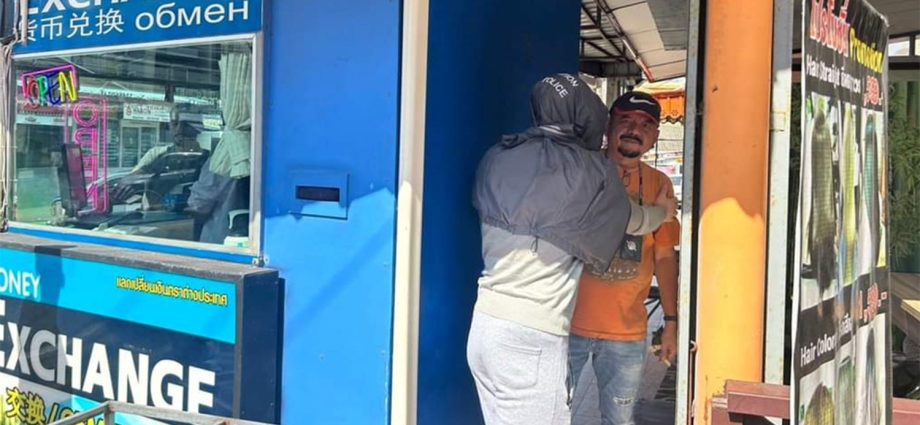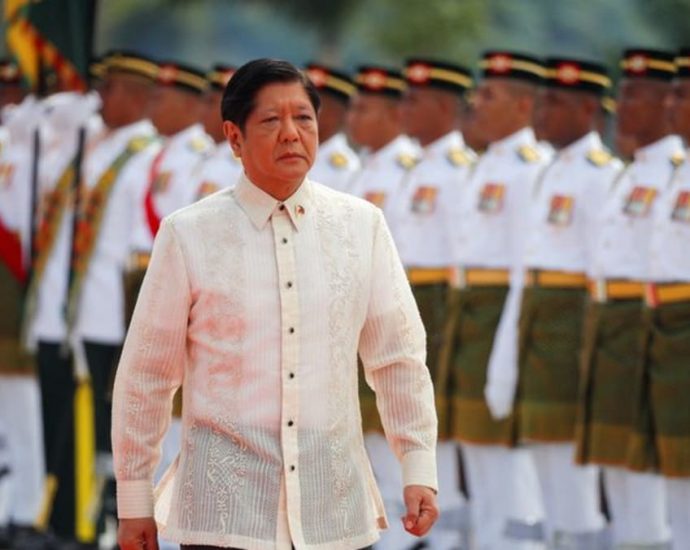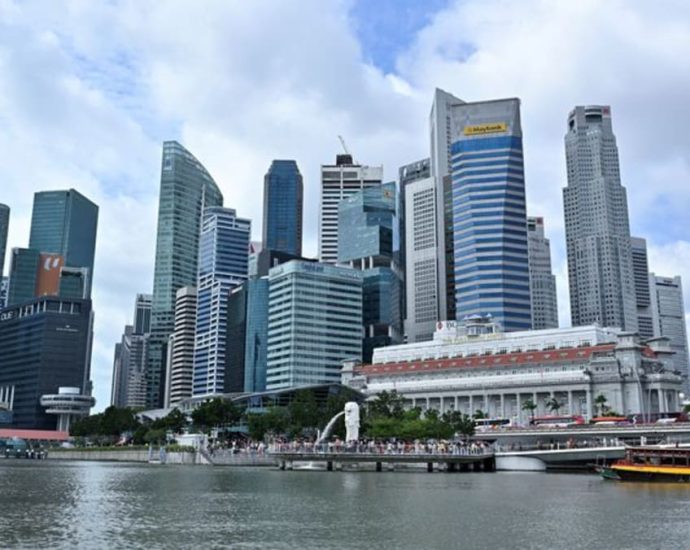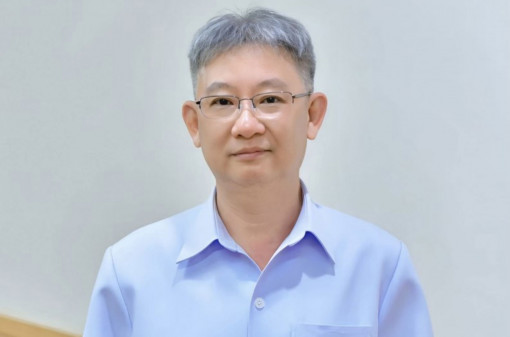Israeli held for Phuket robbery attempt
Suspect also facing charge of assaulting woman at currency exchange
PUBLISHED : 23 Jan 2024 at 20:07

PHUKET: An Israeli man has been apprehended in connection with an attempted robbery at a currency exchange in Phuket.
The 26-year-old suspect, whose name was not disclosed, was arrested on Monday at an unknown location on the resort island, said Pol Col Chalermchai Hernsawad, the Patong police chief.
Police said the man tried to rob and assault a woman at the currency exchange in the Patong area on Dec 31. He ran away after the woman screamed for help.
Police reviewed video from security cameras to track the man’s escape and location, finally leading to his arrest this week.
He is facing charges of attempted robbery, assault and overstaying his visa.
The suspect has denied the charge of attempted robbery, said Pol Col Chalermchai.

The Israeli suspect shows police the Patong currency exchange he is accused of attempting to rob. (Photo: Achadthaya Chuenniran)
Spanish triple murder linked to online romance scam
 Alejandro Martinez Velez/Europa Press
Alejandro Martinez Velez/Europa PressSpanish police are investigating the circumstances surrounding the murder of three elderly siblings and its connection to an online romance scam that two of them were caught up in.
The civil guard have arrested a 42-year-old man of Pakistani origin, identified as Dilawar Hussain F.C.
They said he handed himself in and confessed to the murders.
The bodies of siblings Amelia, 67, Ángeles, 74, and José Gutiérrez Ayuso, 77, were found at their home last week.
They had been partially burned.
The three lived together in Morata de Tajuña, a town of around 8,000 inhabitants south-east of Madrid.
The civil guard said the motive of the crime appeared to be a debt the siblings had with the suspect, linked to the sisters’ apparent involvement in an online scam.
Friends and neighbours of the siblings have told local media of how Ángeles and Amelia had been engaged for several years in online relationships with people claiming to be men from the US.
According to these reports, the two women had sent up to €400,000 (£340,000) to a man they knew as “Edward”, supposedly in the US military, and a friend of his. At least some of their contact with these people was via Facebook.
José Gutiérrez Ayuso, who had a mental disability, was not involved in the sending of the money.
These relationships had exhausted the siblings’ finances, causing the sisters to ask local people for money and approach informal lenders. They even asked the mayor and priest of Morata de Tajuña for money, according to Spain’s ABC newspaper.
Mr Hussain had got to know the siblings when he lived in their home as a lodger for several months. He told police that the sisters owed him a large sum of money which he had given them as a high-interest loan but which they had failed to pay back.
Mr Hussain attacked Amelia twice when still living in her home, the second time in February of 2023 with a hammer, causing her to require medical attention. He received a two-year jail sentence and a restraining order but was released after seven months last September.
Police entered the home of the three siblings on Thursday, after neighbours said they had not seen or heard from them for several weeks.
Enrique Velilla, a local man who was a friend of the siblings, said that the women’s insistence on sending money to their supposed boyfriends had caused them to sell a property they owned in Madrid.
He also said that their requests for money had caused their bank to warn them about a possible scam.
“We told them that it was all a lie, that it was a scam,” he said. “But they didn’t want to hear the word ‘scam’.”
He added: “Ángeles was a teacher and Amelia had an education. They weren’t stupid. They were ordinary people who fell in love.”
More on romance scams: How I lost £120,000 to romance scam gaslighting
Further support via BBC Action Line
Related Topics
-
-
24 December 2023

-
Dengue infections up for seven straight weeks; NEA urges ‘immediate action’
NEA advised members of the public to use insect repellent, wear long-sleeved tops and long pants, and to spray insecticide in dark corners of the house. “There are four dengue virus serotypes circulating in Singapore. Currently, dengue virus serotype 2 (DENV-2) has been predominant since Sep 2023, with prior periodicContinue Reading
Philippines’ Marcos says does not endorse Taiwan independence, seeks to avoid conflict
MANILA: Philippine President Ferdinand Marcos Jr said he does not endorse Taiwan independence and reiterated his country was committed to its One-China policy, a response to China’s outrage over recent remarks in congratulating Taiwan’s election winner. Marcos said in an interview with GMA News TV aired on Tuesday (Jan 23)Continue Reading
Man to be charged for allegedly attempting to murder woman by pressing pillow over her face
SINGAPORE: A 34-year-old man will be charged on Wednesday (Jan 24) for allegedly attempting to murder a 77-year-old woman in Serangoon. The police said on Tuesday that they were alerted to a case of assault at a residential unit along Serangoon Central. Preliminary investigations showed that on Jan 16, theContinue Reading
Man to be charged with attempted murder; allegedly pressed pillow over woman’s face
SINGAPORE: A 34-year-old man will be charged on Wednesday (Jan 24) for allegedly attempting to murder a 77-year-old woman in Serangoon. The police said on Tuesday that they were alerted to a case of assault at a residential unit along Serangoon Central. Preliminary investigations showed that on Jan 16, theContinue Reading
Ukraine: Zelensky may soon oust military chief Zaluzhny – Asia Times
Rumors are making the rounds in Kiev that Ukrainian President Volodymyr Zelensky will fire the head of his armed forces, General Valerii Zaluzhny.
Zelensky and Zaluzhny have been at odds for some time. The excuse is likely to be losses in and around Avdeevka, which is a Ukrainian military stronghold just north of Donetsk. The rumor says that Kyrylo Budanov, head of military intelligence, will replace Zaluzhny.
Field reports show that the Russians have advanced in the southern part of the town, knocking out numerous trenches and fortifications, with the Russian operation gaining momentum and strength as new troops are poured into the fight.
There is little doubt that Russia will be successful. While the Ukrainian army may be able to delay the Russians, it lacks any ability to stop them cold. If Ukraine tries to bring in extra forces to bolster its chances, it will open itself up to Russian threats elsewhere along the line of contact.
Avdeevka, no matter its importance, is just an excuse for Zelensky. He needs loyal people around him as his situation becomes more precarious. His European and American allies, who still say they want to give him what he wants in arms and financial aid, understand that Ukraine can’t stand up to Russian military pressure.
That is why Europe is now in a panic and Washington is searching for a new policy. Europe believes that if Russia wins in Ukraine, as now seems likely, then Europe will be threatened by Russia, for which it is not prepared.
NATO’s chiefs, as well as politicians in Germany, Sweden, Holland, Estonia, Poland and elsewhere, are clamoring for strengthening NATO’s defenses.

The nearly five-month-long NATO exercise, starting in late January, is an effort to demonstrate to Russia that NATO will stand and fight. But the exercise may also show the Russians just what they need to do if a conflict does come.
NATO’s alleged 90,000-soldier exercise has been given the lofty name Steadfast Defender and is supposed to reinforce the notion of NATO reliability. The Russians, meanwhile, have canceled their big military exercise, known as Zapad (West), a message understood by Europe. Russia says it must focus on training its new soldiers, sailors and airmen.
Europe has little to fall back on, as its security is acutely dependent on the United States. Since the collapse of the Soviet Union, and perhaps well before, the Europeans have focused on social spending and have invested little in defense programs.
Worse still, many of them have sent their strategic reserve war materials to Ukraine, leaving them with empty shelves and warehouses.
In Germany, which was supposed to rebuild its armed forces under the slogan Zeitenwende (Turning Point), the government has been raiding the US$108 billion fund to give money and arms to Ukraine.
While Russia appears to have ordered its defense manufacturing companies to work additional shifts to produce armaments, little has been done in Europe or the United States to substantially move forward production.
Instead, there are labor shortages, supply chain issues and slow procurement orders. Meanwhile, the US has unloaded most of its critical war-fighting supplies on Ukraine, leaving great uncertainty if America could rescue Europe, even if it wanted to do so.
Putting aside the credibility, or lack thereof, of any imminent Russian threat to Europe, the US is changing its policy and is recognizing that it cannot win a conventional war against Russia. (Which also means that it can’t win a conventional war against China, maybe not even Iran or the minuscule Houthis.)
All of this is clearly visible in Iraq where US bases and installations are regularly bombed by Iranian militias, following orders from Tehran. Their goal is for US troops to leave Iraq and Syria and, accomplishing that, demonstrate that the US is unreliable and unfit to depend upon.
The new Ukraine policy has been emerging over recent months. If understood correctly, the policy is designed to deal with the new reality that Ukraine will lose the war and Ukraine’s government may need to evacuate Kiev. Putting Budanov in effective control, including for the relocation of Ukraine’s capital, probably to Lviv, is the bedrock of the policy.

Operationally, the policy will likely be to use special operations, assassinations, bombings and any other means, including possibly blowing up a nuclear reactor, to punish the Russians and keep them off balance.
Zelensky is already setting the stage by saying Russia will blow up a nuclear reactor. The Russians are no doubt keenly aware that the target will be a reactor in western Russia and it will be Ukrainian saboteurs who undertake the mission.
For Washington, there are three imperatives. The first is to be able to keep the war going and to keep demanding money from Congress. This is a hard act because if Ukraine is collapsing it will be hard to get buy-in for a losing proposition.
The reality is likely to be that the Biden administration does not expect that Congress will fork over more billions, especially if it is all but certain to go down a rat hole. What they want to do is blame Congress and the Republicans for the loss of Ukraine.
The second imperative is to keep a pro-Western Ukrainian government functioning, even if it has to abandon Kiev. It also means that the current government has to survive politically: if a coup d’etat happens, then all bets are off.
So Washington needs to prevent a political breakdown. This is a tall order because Ukrainians are understandably unhappy, in fact miserable, as young and old men are forced to fight a losing war and many of them don’t come home.
The third imperative is to keep Russia out of Europe, meaning to keep European countries from cutting their own deals with Moscow. As Kiev goes, so goes Europe and NATO.
If the Russians can put a pro-Russian government in Kiev, the Europeans will need to find a practical solution to living with Moscow. The key actor is Germany and the current German government won’t talk to Russia, at least not now. But that may change in the near future.
If Ukraine falls, Germany will need to change its policy. The easiest way for its government to change direction is to blame the United States for something, such as the Nord Stream pipeline’s destruction. That would open the door to a conversation with Putin.
Stephen Bryen, who served as staff director of the Near East Subcommittee of the
US Senate Foreign Relations Committee and as deputy undersecretary of defense
for policy, currently is a senior fellow at the Center for Security Policy and Yorktown Institute.
This article was originally published on his Weapons and Security Substack and is republished with kind permission.
Singapore’s Asia Genesis closes hedge fund after losing bets on China, Japan
HONG KONG: Singapore-based Asia Genesis Asset Management is liquidating its hedge fund after a “significant and unprecedented drawdown” following missteps in Chinese and Japanese bets. The Asia Genesis Macro Fund lost 18.8 per cent in the first weeks of January, Chief Investment Officer Chua Soon Hock said in a letterContinue Reading
Police say net idol slain by boyfriend
Killer known to have major gambling debts later found dead from gunshot in his apartment
PUBLISHED : 23 Jan 2024 at 18:58

Police say they have concluded their investigation into the death of Thamolwan “Wanjeab” Chaloemchaisri, an internet idol and club DJ, who was shot in the head by her boyfriend, who was later found dead.
Thamolwan, 23, was found dead in her apartment in the Huai Khwang area of Bangkok at 4.30am on Monday. She had a gunshot wound above her left ear, and a handgun was found on her left hand, said Pol Col Prasopchok Iampinij, the superuntendent of the Huai Khwang police station.
The scene initially suggested a suicide. However, he said that some abnormalities, including the fact that Thamolwan was right-handed, were pointed out during the investigation, leading to the police questioning more people.
The victim’s boyfriend, identified only as Thinh or “Hia Chat” (Brother Chat), was seen leaving Thamolwan’s apartment at 6.37am on Saturday and was considered a prime suspect.
When Rattanathibet police arrived at his apartment in the Sanam Bin Nam area of Nonthaburi, they heard a gunshot inside. Thinh, 41, was found lying on the floor and later succumbed to his injuries.
The investigation concluded that Thinh had killed Thamolwan. However, the case against him was suspended automatically following his death.
According to Pol Col Prasopchok, officers are still trying to determine whether Thinh’s motive for killing Thamolwan stemmed from online gambling losses. Friends told police that those losses ran to at least a billion baht.
The Office of the Attorney General is also investigating an assault on Thamolwan that took place last November in Cambodia.
The OAG confirmed that Thamolwan was assaulted by Thinh and another Thai national, said Pol Col Prasopchok.
âDigital health platformâ to be expanded
Use of digital tools improves provision of healthcare services to the public

The Ministry of Public Health is preparing to expand its Digital Health Platform, in which the provision and management of healthcare services are digitised as much as possible.
The first pilot phase of the programme under the universal health coverage (UHC) scheme began on Jan 7 in four provinces: Phrae, Phetchaburi, Roi Et and Narathiwat.
Eight more provinces will be added in the second phase, said Dr Opas Karnkawinpong, the ministry’s permanent secretary. They are Phetchabun, Nakhon Sawan, Nong Bua Lam Phu, Amnat Charoen, Nakhon Ratchasima, Sing Buri, Sa Kaeo and Phangnga.
People registered under UHC in the eight provinces will be able to identify themselves with their national ID cards when seeking health services at any participating facility. Other aspects of service provision, including patient health records, will be accessed, stored, updated and shared digitally and remotely among authorised providers, said Dr Opas.
In the first phase, some health services are being provided remotely, such as seeing a doctor via telemedicine, getting a prescription and having the prescribed medications delivered by various means such as by a delivery rider or a health volunteer, he said.
Fifty-nine percent of prescribed medications are now being delivered to patients in the first four provinces, he said.
A conference for healthcare providers is planned for Feb 1 and 2 to update progress in their preparation for the second phase of the programme.
Aside from promoting digitisation of healthcare services, the ministry is also responsible for protecting patients’ rights when it comes to personal information stored on the ministry’s digital platform, said Dr Opas.
The ministry is now seeking cabinet approval of a draft bill that would regulate and ensure confidentiality and safety of the handling of patients’ personal information under this project, he added.
So far, 26,276 medical doctors, dentists, pharmacists and medical technologists under UHC have registered to identify themselves while performing their tasks using a digital ID, 7,549 of whom are are authorised to use digital signatures.
In another development, the National Health Security Board, which oversees the UHC, has approved the provision of self-test kits for liver fluke infections under the programme.
Liver fluke infections are a main cause of cholangiocarcinoma, or bile duct cancer, said Public Health Minister Cholnan Srikaew, adding that Thailand recorded 195,207 bile duct cancer cases between 2014 and 2022.
Thailand has the highest rates of bile duct cancer in the world. Most liver fluke infections are linked to the consumption of koi pla — raw fish ground with spices and lime — in northeastern Thailand.
The test kits will be be made available free of charge for UHC-registered people aged 15 years and older, to help improve early detection of this key indicator of high risk for bile duct cancer, the minister said.











